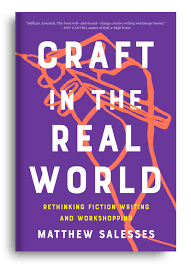I’ve read two books recently that are knocking over some of the great pillars of craft supporting my writing practice. I’m both disconcerted and thrilled.

First, Craft in the Real World: Rethinking Fiction Writing and Workshopping. Matthew Salesses, a Korean American novelist, explores how culturally bound our contemporary literary standards are, which is why they so often fail those writing in nondominant cultural contexts or to non-white audiences. While Salesses’ focus is on culture, his critique also applies to women; the literary values taught in English classrooms and writing workshops have been established by white male authors writing for white male readers, and aren’t necessarily the be-all-and-end-all of good literature. For instance, the notions that plot is initiated by a character’s thwarted longing, or that rising conflict (man vs. nature, man vs. man, or man vs. self) is necessary to propel a plot forward—these aren’t inalienable truths; they’re techniques that speak to one particular audience.
Yup. Part of me has known this all along. The other part wants to shout, “Wowzer!” and call up all my former students to undo the damage I’ve done.

At Salesses’ recommendation, I picked up Yoko Ogawa’s The Housekeeper and the Professor, an absolutely delightful, amazingly conflict-less novel that nonetheless kept me breathless. The mysteries in this novel (Why is the professor’s sister-in-law so standoffish? Why does the professor love children so much?) go unsolved. What little conflict there is (mostly between the characters and the professor’s memory loss) doesn’t build, nor is it central. Instead there’s a lovely tension that deepens over the course of the story between the characters’ relational limitations, given the professor’s memory problems, and the way mathematics becomes a shared love language. I’m gripped by the steady increase of affection between the housekeeper and the professor. That’s it.
When I put the book down, I felt profoundly refreshed. For the first time in years, possibly ever, I’d been propelled through a story not by conflict or mystery but by two intriguing characters’ deepening connections. Story is not what I’ve assumed. How tremendous!
While this might sound like English-major fanaticism, the implications are huge. Consciously or not, we frame our life experiences as stories. If we assume thwarted longing or rising tension or massive struggle are necessary to give our lives structure, or when we derive worth and meaning from these dimensions of our lives, we’re unintentionally constrained within our stories’ unseen boundaries. We make them our reality.
Readers around the world and within the United States live very different realities from our dominant narrative. Ultimately, isn’t this freeing to know? And to know as writers and as humans, we are not bound to the same old plot. We get to choose our own.
–Elizabeth Jarrett Andrew